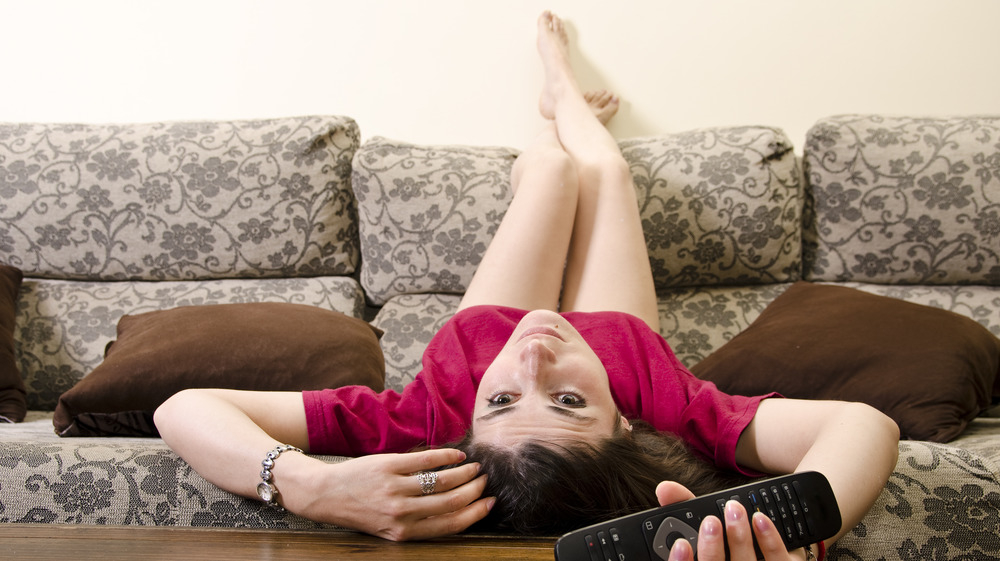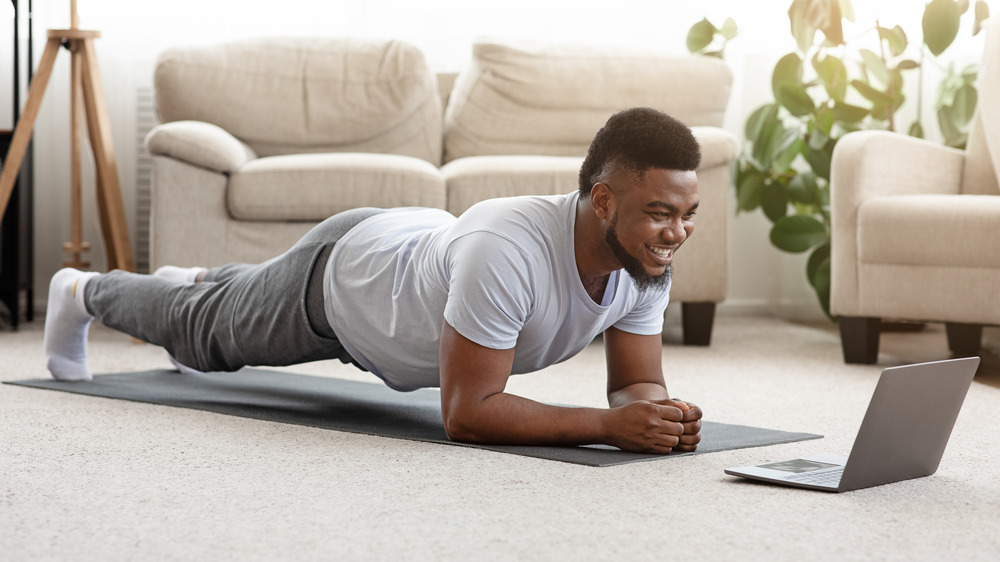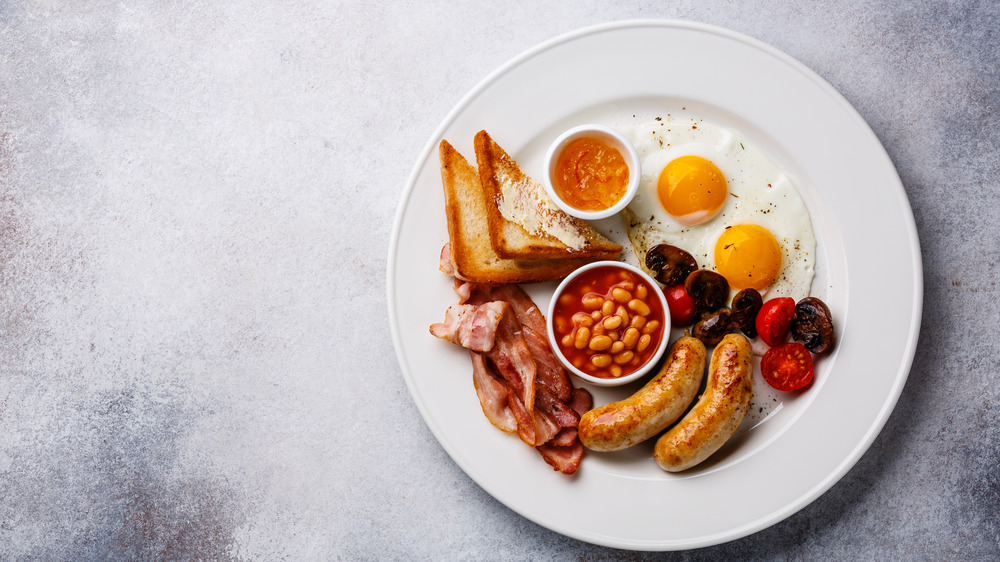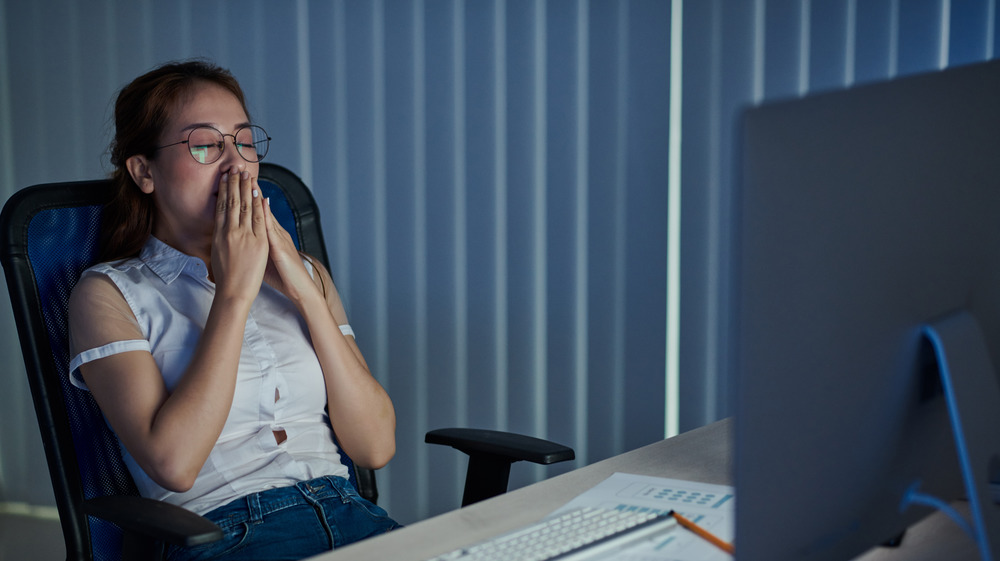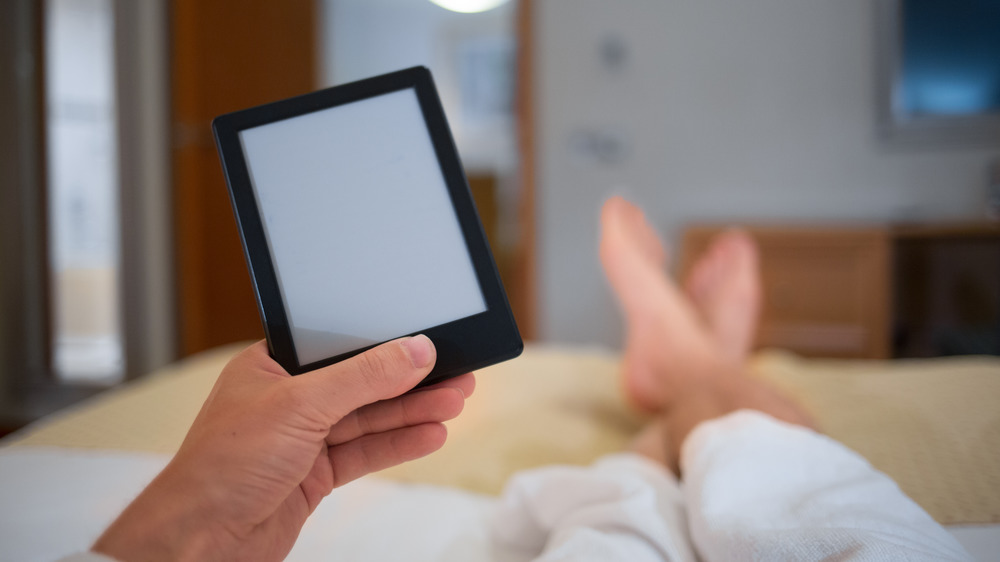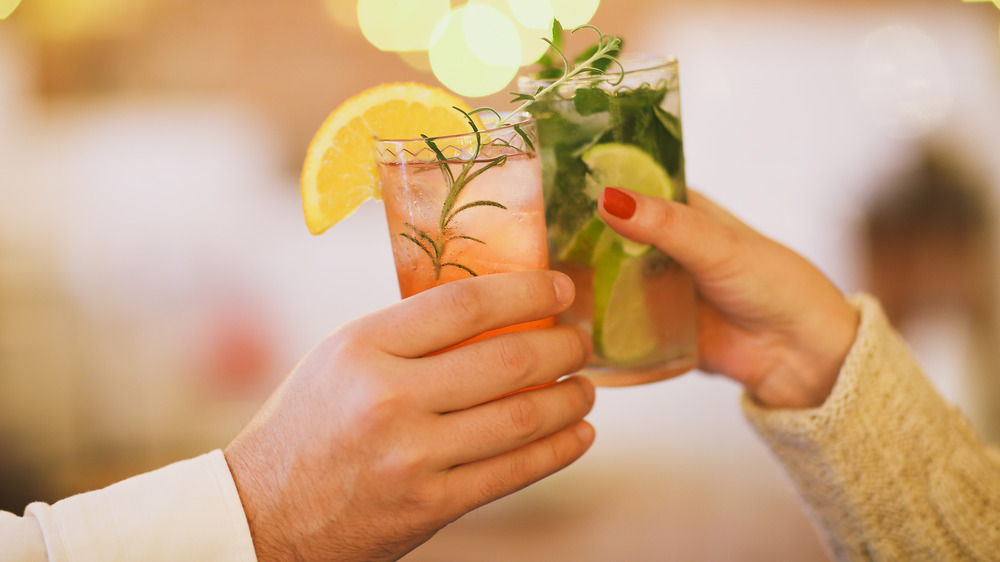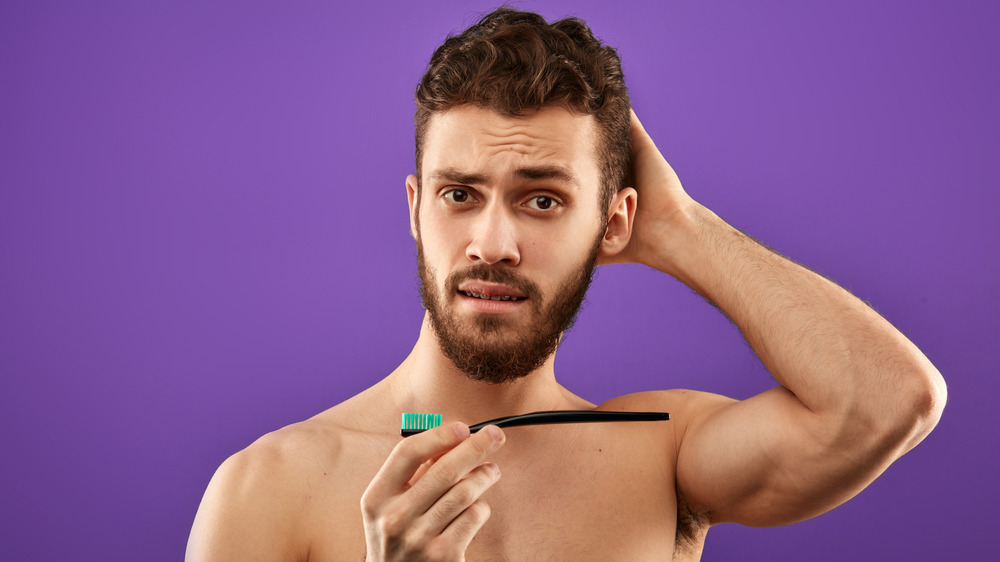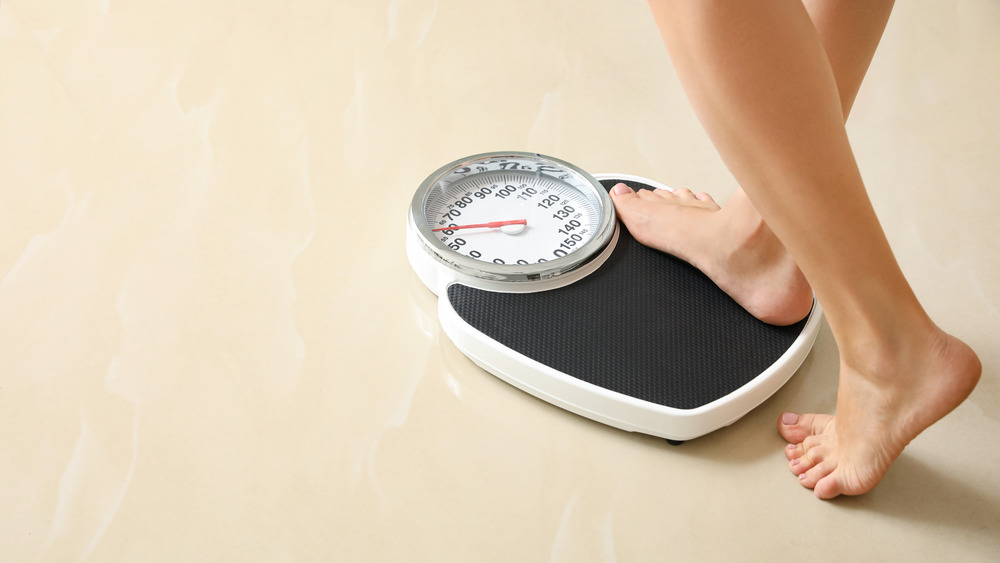What Every Healthy Person Secretly Does But Would Never Admit
Is there a secret to good health? Apparently, there is, but it's probably not what you think it is. When Health Digest asked fitness and nutrition expert Stephanie Jameson what exactly makes a "healthy person" healthy, here was her surprising response: "Beneath the surface of every healthy person is a human being — and an imperfect one at that." But that's not all. Apparently, being truly healthy, both inside and out, requires not only knowing this but also truly believing it.
Many individuals believe that eschewing fatty foods, limiting caffeine intake, and working relentlessly for that "perfect" body and mind will "catapult them into a whole new identity," according to licensed mental health counselor and professor of Northern Illinois University, Suzanne Degges-White Ph.D. (via Psychology Today). However, as Dr. White puts it, while making healthy choices is always wise, it's also important to allow ourselves to be "'just okay' – or even a 'little less than okay.'"
And so, as Jameson advised Health Digest, "No more acting like healthy people are perfect!" Don't believe it? Then do read on for a rare glimpse into what every healthy person secretly does but would never admit.
A healthy person will skip a workout and they won't beat themselves up over it
There's a reason Andy Samberg and Chris Parnell's iconic "Lazy Sunday" song made such an impact when it first hit the airwaves more than a decade ago and continues to resonate today: everyone everywhere understands the joy of embracing their inner sloth occasionally. And not necessarily just on Sunday either, according to registered dietitian, Sylvia Meléndez-Klinger.
"I exercise most days of the week for a minimum of 60 minutes, but I also randomly take off a day here and there if I'm just not feeling it, whether physically or mentally," Melendez Klinger told Health Digest. "As I tell my clients, part of a healthy lifestyle and weight is not fixating on never missing a day." And here's why doing the same workout every day could even be less than healthy.
Further, "while there are many good reasons to skip a workout, there's also room for skipping for no reason at all," added registered dietitian Colleen Christensen. "Sometimes the healthiest thing you can do is to take a day just to relax. It can actually help make for a more sustainable workout routine overall."
A healthy person doesn't necessarily work out their abs every day
There's a "myth" that healthy people work out their abs every day, according to Kelly and Daniel Segars, the fitness pros from the workout app, Fitness Blender. However, as the Segars noted on their website, there are situations where working your abs every day could undermine your progress. Avoiding "over training" is just one of the reasons why taking days off between workouts is so important to your health, and it applies to ab exercises too. Physical therapist Tyler Tredway concurs. She told Health Digest, "you can be perfectly fit and healthy even if you don't work out your abs every single day."
And here's another secret that healthy people seem to know: crunches and other types of sit-ups are not the be-all and end-all to getting great abs. First, some forms of exercise, such as running and yoga, take care of your abs just as well as if you were engaging in an intentional, focused "abs" routine, according to Runners World. And when it comes to a focused ab routine, planks are just as good, if not better than sit-ups, according to Harvard's Healthbeat.
A healthy person knows when it's okay to skip a meal
It might appear there's a debate among experts about whether a healthy person will ever skip a meal. For example, Piedmont Healthcare clinical dietitian, Haley Robinson, has stated that skipping meals "can also cause your metabolism to slow down, which can cause weight gain or make it harder to lose weight" (via Piedmont Healthcare). Yet registered dietitian Trista Best maintains that "healthy people will eat according to their hunger," as she told Health Digest, "and no one is always hungry at mealtime."
But are these two views really in opposition? Robinson's concern is that when you "go a long time without eating, your body goes into survival mode," causing cravings that may be impossible to deny. However, Best clarified that healthy people don't skip meals when they're hungry. Rather, a healthy person lets hunger be their guide, a practice Best told Health Digest is a way of practicing mindfulness in your eating habits. Best's view is in accord with a 2016 study published in the Journal of the Association for Consumer Research, which observed waiting to feel moderate hunger before a meal was associated with healthier blood glucose levels post-meal.
Plenty of healthy people skip breakfast more often than not
Anti-aging expert Gregory Charlop, MD told Health Digest there are some very good reasons why healthy people — including doctors, skip breakfast. First, if skipping is part of an intermittent fasting program, it may help slow down the aging process. Second, when you replace breakfast with black coffee or water, you may find yourself more productive because your body isn't directing its energy toward digestion. Third, skipping breakfast has been found to be supportive of weight loss and weight control. In fact, a 2018 meta-analysis of 13 clinical trials published in BMJ demonstrated eating breakfast may actually be detrimental to weight management.
Although the study authors pointed out that more research is needed to fully understand the mechanism at work in this regard, registered dietitian Trista Best explained that the issue may not be breakfast itself, but what people tend to eat for breakfast. Breakfast, as Best told Health Digest, often translates to foods high in carbs, resulting in an inflammatory response, which is the body's way of healing cell damage but can lead to serious health problems over time (via Cleveland Clinic).
A healthy person will sometimes have a bad eating day
Over the last several years, as "cheat days" have been sanctioned by more and more nutrition experts (via MedicineNet), they've also become de rigueur as an occasional planned diversion both for people looking to lose weight and people already at a healthy weight. While healthy people enjoy the occasional cheat day, they also enjoy the occasional unplanned day of eating for pleasure. As registered dietitian, Sylvia Meléndez-Klinger advised Health Digest, just like with the occasional skipped workout, it can be within the "healthy person toolkit" to allow and accept the need to spontaneously let go of the reigns with regard to eating, at least on occasion.
"It's actually healthier to just let yourself have a 'not-so-healthy' day here and there, without scheduling it as a 'cheat day' because it emphasizes that healthy eating is about balance," according to Meléndez-Klinger. And as registered dietitian Colleen Christensen pointed out, "Living a healthy life includes having cravings and occasionally answering to them, and having a healthy relationship with food means not stressing out when that happens."
Sleep is critical to good health, but a healthy person might sacrifice sleep on occasion
Healthy people respect their need for sleep. But even with so many rules detailing how much sleep you really need, there is a school of thought which some health experts subscribe to, and that letting yourself stay up too late on occasion is not inconsistent with being "healthy." While it is, of course, important to generally adhere to a bedtime routine, fitness and nutrition expert, Stephanie Jameson told Health Digest, "it's also part of a healthy person's life to have fun experiences that might occasionally eat into that routine."
That being said, it's worth noting that sleep deprivation can have negative consequences in the short term, as certified Sleep Science Coach, Alex Savy, pointed out to Health Digest. The good news, however, is that sleep debt can be repaid, according to Lawrence J. Epstein, medical director of the Harvard-affiliated Sleep HealthCenters (via Scientific American).
Even healthy people embrace the blue light of devices before bed
Reading before bed is scientifically-approved (via Inc.), and many healthy people put off closing their eyes in order to catch up on their reading. In fact, some of the most healthy and successful people read before bed, according to Michael Breus, PhD, writing for his website, The Sleep Doctor. There is, however, a potential pitfall if you're reading on a device that emits blue light, as many phones and other e-reading devices do. This blue light is associated with a decrease in the amount of melatonin produced by the body, and a lack of melatonin could interfere with sleep, according to Jennifer Henry, Director of the Counseling Center at Maryville University.
However, blue light is not all bad, according to the Better Vision Guide, which pointed out that blue light can "boost alertness and mood," as well as "[support] cognitive function." Nevertheless, there are things you can do to mitigate the negative consequences associated with blue light exposure, including investing in a pair of blue-light filtering eyeglasses.
You can enjoy a cocktail and still be healthy
"Yes, you can enjoy a cocktail!" health expert Fiona Gilbert advised Health Digest when we asked whether enjoying the occasional cocktail or wine-with-dinner precludes one from being considered "healthy."
"I have a glass of wine or a scotch and soda with my dinner," she assured us, adding, "and sometimes I convince my workout buddy to get beers and wings instead of working out."
The key is moderation. It's also recognizing your limits, according to Dr. Christopher Johnston, chief medical officer and addiction expert at Pinnacle Treatment Centers. "If you are of legal drinking age and have never been diagnosed with a substance use disorder and are not prescribed any medication that interacts with alcohol then consumption of one standard drink per day for a non-pregnant woman, and two for a man, appears to carry no health risks, with the exception of certain cancers," Dr. Johnston told Health Digest.
You can be perfectly healthy and also use marijuana on occasion
CBD (short for "cannabidiol," one of the two active ingredients in marijuana) usage has become increasingly acceptable, not only for those dealing with health conditions but also for people who are perfectly healthy (via The New York Times). But CBD is not the only active ingredient in marijuana that healthy people occasionally consume. according to health expert, Fiona Gilbert, she uses THC-infused edibles for sleep and relaxation. THC is short for "tetrahydrocannabinol," the primary substance in marijuana that causes its "psychological effects," according to A.J. Fabrizio, a marijuana chemistry expert (via Live Science).
The key here is the word "healthy," however. For example, as Live Science pointed out, marijuana usage in schizophrenics may cause a relapse of symptoms. But assuming there is no underlying health condition that precludes marijuana use (where it is legal), and assuming one isn't driving under the influence of marijuana, indulging in it (again, where legal) may actually offer health benefits, including offering anxiety relief, according to Kevin Hill, MD, per The Harvard Gazette.
A healthy person won't necessarily run to the doctor as soon as they feel a minor twinge
There are times when you must seek medical attention as soon as possible. These include sudden difficulty breathing, pain or pressure in the chest or abdomen, and sudden dizziness or confusion, according to Emergency First Response. There are also times when it makes good sense not to delay making a doctor's appointment, such as if you happen to observe you have a mole that has changed. Healthy people are able to appreciate the difference between emergent and non-emergent medical situations, according to health expert, Fiona Gilbert, who makes a practice of exercising reasonable caution before "running off" to her doctor.
"While of course there will be times when you need to see a doctor as soon as possible, in many situations, you can wait a week and see if your symptoms abate," Gilbert told Health Digest. Moreover, if every time your throat feels scratchy, your first thought is "I need to get to the doctor because I might have cancer," the thing you should be worrying about probably isn't cancer so much as an anxiety disorder (via Harvard Women's Health Watch).
Healthy people take care of their mental health, which may include quitting therapy
A healthy person isn't someone who never needs the assistance of a mental health professional, but rather someone who knows when to seek help, according to health expert Fiona Gilbert. But a healthy person also knows when it's time to move on from a particular therapy or therapist, Gilbert told Health Digest. Therapist and addiction specialist, Dr. Cali Estes concurs: "Emotionally healthy people know when they feel better about life and their situation. They are able to stop their current therapy or move on to a different therapist that may take them in a new undiscovered direction."
Quitting therapy is healthy when you've reached your intended goals and are able to manage life stressors without becoming overwhelmed, licensed clinical social worker, Janika Joyner told Health Digest. Terminating therapy can also be healthy if you don't feel a connection with your therapist, or according to Joyner, who likes to say, "Therapy is for everybody, but not every therapist is for everybody."
A healthy person doesn't sweat it if they can't brush their teeth for whatever reason
"Brushing your teeth is an important part of your dental care routine," according to the American Dental Association (ADA), not to mention every dentist ever. In fact, the ADA recommends brushing not once but twice each day "for a healthy mouth and smile." But even healthy people understand that this isn't always possible, according to Schaumburg Dental Studio, which offered several alternatives to literal "brushing" (as in, with a toothbrush).
These alternatives include oil-pulling, rubbing a paste made of water and baking soda on the teeth, flossing, rubbing the teeth with a bit of sturdy paper towel, and just plain old swishing with water. And some of these — most notably, oil-pulling, scrubbing with baking soda, and flossing, offer their own health benefits that you don't get from simply brushing. Oil-pulling, for example, "is said to remove toxins from your mouth," while "flossing is a great way to remove food debris or plaque from in-between your teeth and avoid excess bacteria growth within your mouth" (via Schaumburg Dental Studio).
Spending some time focusing on stuff that bothers you is one of the marks of an emotionally healthy person
There's an old saying that says something to the effect of, "Pain is inevitable. Suffering is optional." It's been attributed to many wise people, such as Dalai Lama and the author, Haruki Murakami (via Wilcox & Barton). The idea is that bad things will happen, and there's nothing we can do about that, but we do have some control over how we react to bad things. While some might take this as a suggestion to push away unpleasant thoughts, healthy people give themselves a wide berth to process their feelings, according to Gregg Henriques, Ph.D., (via Psychology Today).
"Emotionally healthy people let themselves sit with feelings that are uncomfortable," executive coach, Paul Litwak, told Health Digest. That's what Litwak did while volunteering at Ground Zero in the wake of September 11, 2001. To be clear, Litwak is not advocating ruminating, which involves thinking the same thoughts over and over. Rather, he's advocating acknowledging and processing your feelings, which can include journaling or otherwise setting aside structured time in which to engage in active thought.
Some healthy people make a point of not weighing themselves
Both Noom and Weight Watchers require weigh-ins. However, the scale has been known to play cruel tricks — such as showing weight gain after a workout or when you're fighting a cold. Accordingly, some health and diet experts subscribe to the school of thought that healthy people recognize the scale's limitations, as well as their own with regard to the scale. That's why plenty of healthy people don't weigh themselves. For example, health expert and ACSM-certified fitness trainer Fiona Gilbert, who doesn't even own a scale, assesses how her eating plan is going using how she feels and how her clothes fit.
Registered dietitian Colleen Christensen told Health Digest that one of the first things she tells her weight-loss clients is to ditch the scale. "The number doesn't necessarily equal our health," according to Christensen, "and focusing on a number can do more harm than good." Whether weighing yourself is helpful or harmful is ultimately up to you to decide. But if you feel it's harmful, then the healthy choice is to pursue health behaviors for their own sake, as registered dietitian Alissa Rumsey put it (via Alissa Rumsey Nutrition & Wellness).


